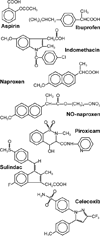Coxibs and other nonsteroidal anti-inflammatory drugs in animal models of cancer chemoprevention
- PMID: 21778329
- PMCID: PMC3208782
- DOI: 10.1158/1940-6207.CAPR-11-0166
Coxibs and other nonsteroidal anti-inflammatory drugs in animal models of cancer chemoprevention
Abstract
Coxibs, including celecoxib, and other nonsteroidal anti-inflammatory drugs (NSAID), including aspirin, are among the most promising cancer chemopreventive agents in development today. This article examines the data on the efficacy of these agents in animal model studies of cancer prevention carried out by the authors. The studies evaluated here are restricted to our rodent models of colon/intestinal, bladder, and nonmelanoma skin cancer, in which celecoxib and other NSAIDs were administered as either cancer preventive or therapeutic agents. These studies may shed light on several questions. Is celecoxib unique compared with other NSAIDs, and if so, what implications would this have for human use? Are standard NSAIDs (which inhibit both COX-1 and COX-2) as effective as celecoxib in animal studies? Is the efficacy of celecoxib in particular or NSAIDs in general due to their off-target effects or to their effects on COX-1 and COX-2? What is the likely efficacy of low-dose aspirin? Some questions raised by human trials and epidemiology are discussed and related to our observations in animal model studies. We also discuss the problem of cardiovascular (CV) events associated with coxibs and certain other NSAIDs and whether results in animal models are predictive of efficacy in humans. On the basis of epidemiologic studies and its CV profile, aspirin seems to be the most promising NSAID for preventing human colorectal, bladder, and skin cancer, although the animal data for aspirin are less clear. A comprehensive understanding of the results of coxibs and other NSAIDs in animal studies may help inform and shape human trials of these commonly employed, relatively inexpensive, and highly effective compounds.
Conflict of interest statement
There are no potential conflicts of interest
Figures
References
-
- Chan AT, Ogino S, Fuchs CS. Aspirin and the risk of colorectal cancer in relation to the expression of COX-2. N Engl J Med. 2007;356:2131–2142. - PubMed
-
- Vane JR, Bakhle YS, Botting RM. Cyclooxygenases 1 and 2. Annu Rev Pharmacol Toxicol. 1998;38:97–120. - PubMed
-
- Arber N, Levin B. Chemoprevention of colorectal neoplasia: the potential for personalized medicine. Gastroenterology. 2008;134:1224–1237. - PubMed
-
- Bennett A, Del Tacca M. Proceedings: Prostaglandins in human colonic carcinoma. Gut. 1975;16:409. - PubMed
-
- Jaffe BM. Prostaglandins and cancer: an update. Prostaglandins. 1974;6:453–461. - PubMed
Publication types
MeSH terms
Substances
Grants and funding
LinkOut - more resources
Full Text Sources
Other Literature Sources
Research Materials


